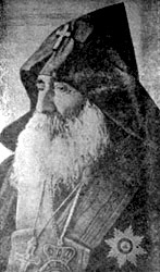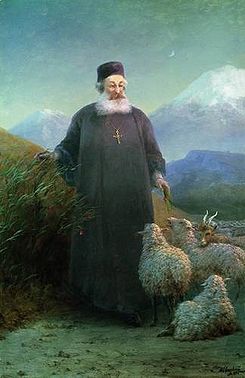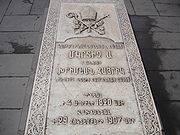
Mkrtich Khrimian
Encyclopedia

Armenia
Armenia , officially the Republic of Armenia , is a landlocked mountainous country in the Caucasus region of Eurasia...
n writer
Writer
A writer is a person who produces literature, such as novels, short stories, plays, screenplays, poetry, or other literary art. Skilled writers are able to use language to portray ideas and images....
, newspaper editor, and political and religious leader. He served as the Armenian Patriarch of Constantinople
Armenian Patriarch of Constantinople
The Armenian Patriarch of Constantinople also known as Armenian Patriarch of Istanbul is today head of The Armenian Patriarchate of Constantinople , one of the smallest Patriarchates of the Oriental Orthodox Church but one that has exerted a very significant political role and today still exercises...
(1869–1873), Prelate
Prelate
A prelate is a high-ranking member of the clergy who is an ordinary or who ranks in precedence with ordinaries. The word derives from the Latin prælatus, the past participle of præferre, which means "carry before", "be set above or over" or "prefer"; hence, a prelate is one set over others.-Related...
of Van
Van, Turkey
Van is a city in southeastern Turkey and the seat of the Kurdish-majority Van Province, and is located on the eastern shore of Lake Van. The city's official population in 2010 was 367,419, but many estimates put this as much higher with a 1996 estimate stating 500,000 and former Mayor Burhan...
(1880–1885) and Catholicos of All Armenians
Catholicos of Armenia
The Catholicos of All Armenians is the chief bishop of Armenia's national church, the Armenian Apostolic Church. It is one of the Oriental Orthodox churches that do not accept the decisions of the Council of Chalcedon. The first Catholicos of All Armenians was Saint Gregory the Illuminator...
(1892–1907). He devoted his life to the betterment of the Armenian
Armenians
Armenian people or Armenians are a nation and ethnic group native to the Armenian Highland.The largest concentration is in Armenia having a nearly-homogeneous population with 97.9% or 3,145,354 being ethnic Armenian....
people, especially the peasantry in eastern Anatolia
Anatolia
Anatolia is a geographic and historical term denoting the westernmost protrusion of Asia, comprising the majority of the Republic of Turkey...
.
Khrimian was born in Van
Van, Turkey
Van is a city in southeastern Turkey and the seat of the Kurdish-majority Van Province, and is located on the eastern shore of Lake Van. The city's official population in 2010 was 367,419, but many estimates put this as much higher with a 1996 estimate stating 500,000 and former Mayor Burhan...
on April 4, 1820. After receiving his primary education, he studied Grabar
Grabar
Classical Armenian is the oldest attested form of the Armenian language. It was first written down at the beginning of the 5th century, and all Armenian literature from then through the 18th century is in the Grabar Armenian language. Many ancient Greek, Persian, Hebrew, Syriac, and Latin...
or classical Armenian as well as Armenology.
Service in Van, 1854-1869
In 1854, he was ordained a priestPriest
A priest is a person authorized to perform the sacred rites of a religion, especially as a mediatory agent between humans and deities. They also have the authority or power to administer religious rites; in particular, rites of sacrifice to, and propitiation of, a deity or deities...
and entered priesthood in the monastery
Monastery
Monastery denotes the building, or complex of buildings, that houses a room reserved for prayer as well as the domestic quarters and workplace of monastics, whether monks or nuns, and whether living in community or alone .Monasteries may vary greatly in size – a small dwelling accommodating only...
of Aght'amar
Akdamar Island
Akdamar Island also known as Aght'amar or Akhtamar, is the second by size of four islands in Lake Van in the south of Eastern Anatolia Region, Turkey, about 0.7 km2 in size, situated about 3 km from the shoreline. At the western end of the island a hard, grey, limestone cliff rises 80 m...
. Khrimian, a progressivist, was resented by his conservative
Conservatism
Conservatism is a political and social philosophy that promotes the maintenance of traditional institutions and supports, at the most, minimal and gradual change in society. Some conservatives seek to preserve things as they are, emphasizing stability and continuity, while others oppose modernism...
brethren, so he left the monastery and gave himself to independent service. Elsewhere, his sermons won him public admiration and affection among Armenians
Armenians
Armenian people or Armenians are a nation and ethnic group native to the Armenian Highland.The largest concentration is in Armenia having a nearly-homogeneous population with 97.9% or 3,145,354 being ethnic Armenian....
. Khrimian was known to be an excellent orator, his speeches full of color and emotion. He established a printing press
Printing press
A printing press is a device for applying pressure to an inked surface resting upon a print medium , thereby transferring the ink...
at Varagavank
Varagavank
Varagavank , also known as Yedi Kilise , was a prominent Armenian monastery founded in the 11th century on the slopes of Mount Varag 9 km east of the city of Van in Turkey's Eastern Anatolia region....
in Van, and thereafter launched Artsiv Vaspourakan (Eagle of Vaspourakan
Vaspurakan
Vaspurakan was the first and biggest province of Greater Armenia, which later became an independent kingdom during the Middle Ages, centered around Lake Van...
), which was the first periodical publication in Armenia
Armenia
Armenia , officially the Republic of Armenia , is a landlocked mountainous country in the Caucasus region of Eurasia...
.
Khrimian urged Armenian peasants to defend themselves against hostile Kurds. He was also successful in repealing illegal taxes imposed against Christian Armenians by the Ottoman
Ottoman Empire
The Ottoman EmpireIt was usually referred to as the "Ottoman Empire", the "Turkish Empire", the "Ottoman Caliphate" or more commonly "Turkey" by its contemporaries...
government.
In 1855, Khrimyan launched “Artsui Vaspurakan”, the first periodical publication
Periodical publication
Periodical literature is a published work that appears in a new edition on a regular schedule. The most familiar examples are the newspaper, often published daily, or weekly; or the magazine, typically published weekly, monthly or as a quarterly...
in Armenia. Garegin Shrvandztyants and Arsen Tokhmakhyan also worked on this periodical together with other pupils of a school founded by Khrimyan.
In 1857 later Khrimyan became the head of Taron, the dean of Saint Karapet seminary.
Armenian Patriarch of Constantinople, 1869-1873
In 1869, Khrimyan was elected Patriarch of Constantinople. Five years later he resigned this position and began his struggle against darkness and injustice. Carrying out an ambitious plan to enlighten his people, Khrimyan was thwarted in his efforts by the antagonism of fellow clergy who presented numerous obstacles to his work.In 1876, on occasion of fire and robbery of Van, Khrimyan wrote “Vangoyzh”, an inspirational appeal for efficient measures instead of complaining of losses and difficulties., When the Russo-Turkish war broke out, he wrote “Haygoyzh”. These two works were enough to proclaim him “Khorenatsi of the 19th century.”* He also wrote “Heavenly Land”, “A Grandfather and a Grandson” and others. Most of Khrimyan’s work greatly influenced the character and social thought of the people of his time.
In 1876, Khrimyan published “His Time and Counsel” in which he expressed his thoughts and views of the constitution of the Ottoman Empire.
In 1878, Khrimyan headed the delegation to represent the will of Armenian people at the Berlin Conference. Upon his return he stated in an eloquent speech entitled, “The Paper Ladle,” that the hopes of the Armenian people for self-determination were ignored by the European community of nations.
Prelate of Van, 1880-1885
In 1878, Khrimyan sent his aid to the starving population of Van and founded an orphanage. In 1878, He began to serve as the PrelatePrelate
A prelate is a high-ranking member of the clergy who is an ordinary or who ranks in precedence with ordinaries. The word derives from the Latin prælatus, the past participle of præferre, which means "carry before", "be set above or over" or "prefer"; hence, a prelate is one set over others.-Related...
of Van
Van, Turkey
Van is a city in southeastern Turkey and the seat of the Kurdish-majority Van Province, and is located on the eastern shore of Lake Van. The city's official population in 2010 was 367,419, but many estimates put this as much higher with a 1996 estimate stating 500,000 and former Mayor Burhan...
whose seat was at Varagavank
Varagavank
Varagavank , also known as Yedi Kilise , was a prominent Armenian monastery founded in the 11th century on the slopes of Mount Varag 9 km east of the city of Van in Turkey's Eastern Anatolia region....
.
In 1885 Khrimyan Hayrik was recalled to Constantinople. Turkish authorities did not appreciate his activities.
Later he was sent to Jerusalem, which, in fact, was an exile.
Catholicos of All Armenians, Echmiadzin (1892-1907)

Echmiadzin
Mother Cathedral of Holy Etchmiadzin is a 4th century Armenian church in the town of Ejmiatsin, Armenia. It is also the central cathedral of the Mother See of Holy Etchmiadzin of the Armenian Apostolic Church....
as head of the Armenian Apostolic Church
Armenian Apostolic Church
The Armenian Apostolic Church is the world's oldest National Church, is part of Oriental Orthodoxy, and is one of the most ancient Christian communities. Armenia was the first country to adopt Christianity as its official religion in 301 AD, in establishing this church...
. Because of his fatherly love and dedication to the common people, Mkrtich Khrimian was affectionately called Khrimian "Hayrik", which means "father" in the Armenian language.
In 1903 the Czarist government of Imperial Russia ordered the confiscation
Confiscation
Confiscation, from the Latin confiscatio 'joining to the fiscus, i.e. transfer to the treasury' is a legal seizure without compensation by a government or other public authority...
of all Armenian ecclesiastical and educational properties. Khrimian, then acting Catholicos
Catholicos
Catholicos, plural Catholicoi, is a title used for the head of certain churches in some Eastern Christian traditions. The title implies autocephaly and in some cases is borne by the designated head of an autonomous church, in which case the holder might have other titles such as Patriarch...
, waged a heroic struggle against the decision, which came to success in 1905 when the Czar published a decree
Decree
A decree is a rule of law issued by a head of state , according to certain procedures . It has the force of law...
reopening Armenian schools and returning church properties.
In 1907 Catholicos Khrimyan died leaving a grieving nation. Khrimyan’s life was an outstanding and extraordinary example of a leader’s dynamic accomplishment in drawing his people closer and closer to their native land and sense of nationhood, both physically and spiritually.

